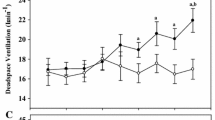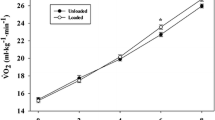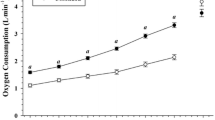Abstract
Weighted backpacks are used extensively in recreational and occupational settings, yet their effects on lung mechanics during acute exercise is poorly understood. The purpose of this study was to determine the effects of different backpack weights on lung mechanics and breathing patterns during treadmill walking. Subjects (n = 7, age = 28 ± 6 years), completed two 2.5-min exercise stages for each backpack condition [no backpack (NP), an un-weighted backpack (NW) or a backpack weighing 15, 25 or 35 kg]. A maximal expiratory flow volume curve was generated for each backpack condition and an oesophageal balloon catheter was used to estimate pleural pressure. The 15, 25 and 35 kg backpacks caused a 3, 5 and 8% (P < 0.05) reduction in forced vital capacity compared with the NP condition, respectively. For the same exercise stage, the power of breathing (POB) requirement was higher in the 35 kg backpack compared to NP (32 ± 4.3 vs. 88 ± 9.0 J min−1, P < 0.05; respectively). Independent of changes in minute ventilation, end-expiratory lung volume decreased as backpack weight increased. As backpack weight increased, there was a concomitant decline in calculated maximal ventilation, a rise in minute ventilation, and a resultant greater utilization of maximal available ventilation. In conclusion, wearing a weighted backpack during an acute bout of exercise altered operational lung volumes; however, adaptive changes in breathing mechanics may have minimized changes in the required POB such that at an iso-ventilation, wearing a backpack weighing up to 35 kg does not increase the POB requirement.






Similar content being viewed by others
References
Babb TG, DeLorey DS, Wyrick BL, Gardner PP (2002) Mild obesity does not limit change in end-expiratory lung volume during cycling in young women. J Appl Physiol 92(6):2483–2490
Bastien GJ, Bnd Schepens, Willems PA, Heglund NC (2005) Energetics of load carrying in Nepalese Porters. Science 308(5729):1755
Butcher S, Jones R, Mayne J, Hartley T, Petersen S (2007) Impaired exercise ventilatory mechanics with the self-contained breathing apparatus are improved with heliox. Eur J Appl Physiol 101(6):659–669
Bygrave S, Legg S, Myers S, Llewellyn M (2004) Effect of backpack fit on lung function. Ergonomics 47(3):324–329
Dempsey JA (1986) Is the lung built for exercise? Med Sci Sports Exerc 18(2):143–155
Dominelli PB, Guenette JA, Wilkie SS, Foster GE, Sheel AW (2011) Determinants of expiratory flow limitation in healthy women during exercise. Med Sci Sports Exerc 43(9):1666–1674
Eldridge MW, Braun RK, Yoneda KY, Walby WF (2006) Effects of altitude and exercise on pulmonary capillary integrity: evidence for subclinical high-altitude pulmonary edema. J Appl Physiol 100(3):972–980
Guenette JA, Witt JD, McKenzie DC, Road JD, Sheel AW (2007) Respiratory mechanics during exercise in endurance-trained men and women. J Physiol 581(3):1309–1322
Guenette JA, Dominelli PB, Reeve SS, Durkin CM, Eves ND, Sheel AW (2010) Effect of thoracic gas compression and bronchodilation on the assessment of expiratory flow limitation during exercise in healthy humans. Respir Physiol Neurobiol 170(3):279–286
Harms CA, Babcock MA, McClaran SR, Pegelow DF, Nickele GA, Nelson WB, Dempsey JA (1997) Respiratory muscle work compromises leg blood flow during maximal exercise. J Appl Physiol 82(5):1573–1583
Henke KG, Sharratt M, Pegelow D, Dempsey JA (1988) Regulation of end-expiratory lung volume during exercise. J Appl Physiol 64(1):135–146
Hyatt RE (1983) Expiratory flow limitation. J Appl Physiol 55(1):1–7
Hyatt RE, Flath RE (1966) Relationship of air flow to pressure during maximal respiratory effort in man. J Appl Physiol 21(2):477–482
Jenkins SC, Moxham J (1991) The effects of mild obesity on lung function. Respir Med 85(4):309–311
Jensen JI, Lyager S, Pedersen OF (1980) The relationship between maximal ventilation, breathing pattern and mechanical limitation of ventilation. J Physiol 309(1):521–532
Johnson BD, Saupe KW, Dempsey JA (1992) Mechanical constraints on exercise hyperpnea in endurance athletes. J Appl Physiol 73(3):874–886
Johnson BD, Scanlon PD, Beck KC (1995) Regulation of ventilatory capacity during exercise in asthmatics. J Appl Physiol 79(3):892–901
Johnson BD, Weisman IM, Zeballos RJ, Beck KC (1999) Emerging concepts in the evaluation of ventilatory limitation during exercise. Chest 116(2):488–503
Legg S, Cruz CO (2004) Effect of single and double strap backpacks on lung function. Ergonomics 47(3):318–323
Legg S, Mahanty A (1985) Comparison of five modes of carrying a load close to the trunk. Ergonomics 28(12):1653–1660
Marciniuk DD, Sridhar G, Clemens RE, Zintel TA, Gallagher CG (1994) Lung volumes and expiratory flow limitation during exercise in interstitial lung disease. J Appl Physiol 77(2):963–973
McCaig RH, Gooderson CY (1986) Ergonomic and physiological aspects of military operations in a cold wet climate. Ergonomics 29(7):849–857
McClaran SR, Harms CA, Pegelow DF, Dempsey JA (1998) Smaller lungs in women affect exercise hyperpnea. J Appl Physiol 84(6):1872–1881
McClaran SR, Wetter TJ, Pegelow DF, Dempsey JA (1999) Role of expiratory flow limitation in determining lung volumes and ventilation during exercise. J Appl Physiol 86(4):1357–1366
Milic-Emili J, Mead J, Turner JM, Glauser EM (1964) Improved technique for estimating pleural pressure from esophageal balloons. J Appl Physiol 19(2):207–211
Miller JD, Beck KC, Joyner MJ, Brice AG, Johnson BD (2002) Cardiorespiratory effects of inelastic chest wall restriction. J Appl Physiol 92(6):2419–2428
Minetti AE, Formenti F, Ardiga LP (2006) Himalayan porter’s specialization: metabolic power, economy, efficiency and skill. Proc R Soc B 273(1602):2791–2797
Mota S, Casan P, Drobnic F, Giner J, Ruiz O, Sanchis J, Milic-Emili J (1999) Expiratory flow limitation during exercise in competition cyclists. J Appl Physiol 86(2):611–616
Muza SR, Latzka WA, Epstein Y, Pandolf KB (1989) Load carriage induced alterations of pulmonary function. Int J Ind Ergon 3(3):221–227
O’Donnell DE, Hong HH, Webb KA (2000) Respiratory sensation during chest wall restriction and dead space loading in exercising men. J Appl Physiol 88(5):1859–1869
Ofir D, Laveneziana P, Webb KA, O’Donnell DE (2007) Ventilatory and perceptual responses to cycle exercise in obese women. J Appl Physiol 102(6):2217–2226
Otis AB (1964) The work of breathing, vol 1. Handbookof Physiology. American Physiological Society, Washington, DC
Salome CM, King GG, Berend N (2010) Physiology of obesity and effects on lung function. J Appl Physiol 108(1):206–211
Sharp JT, Henry JP, Sweany SK, Meadows WR, Pietras RJ (1964) Effects of mass loading the respiratory system in man. J Appl Physiol 19(5):959–966
Sharp JT, Barrocas M, Chokroverty S (1980) The cardiorespiratory effects of obesity. Clin Chest Med 1:103–118
Sharratt MT, Henke KG, Aaron EA, Pegelow DF, Dempsey JA (1987) Exercise-induced changes in functional residual capacity. Respir Physiol 70(3):313–326
Stark-Leyva KN, Beck KC, Johnson BD (2004) Influence of expiratory loading and hyperinflation on cardiac output during exercise. J Appl Physiol 96(5):1920–1927
Tomczak SE, Guenette JA, Reid DW, McKenzie DC, Sheel AW (2010) Diaphragm fatigue following sub-maximal exercise with chest wal restriction. Med Sci Sports Exerc 43(3):416–424
Wang L-Y, Cerny FJ (2004) Ventilatory response to exercise in simulated obesity by chest loading. Med Sci Sports Exerc 36(5):780–786
West JB (ed) (2008) Respiratory physiology: the essentials, 8th edn. Baltimore, MD
Younes M, Kivinen G (1984) Respiratory mechanics and breathing pattern during and following maximal exercise. J Appl Physiol 57(6):1773–1782
Acknowledgments
We thank our subjects for their enthusiastic participation. This study was supported by the Natural Science and Engineering Research Council of Canada (NSERC). G.E. Foster was supported by a post doctoral fellowship from NSERC.
Author information
Authors and Affiliations
Corresponding author
Additional information
Communicated by Susan A. Ward.
Rights and permissions
About this article
Cite this article
Dominelli, P.B., Sheel, A.W. & Foster, G.E. Effect of carrying a weighted backpack on lung mechanics during treadmill walking in healthy men. Eur J Appl Physiol 112, 2001–2012 (2012). https://doi.org/10.1007/s00421-011-2177-8
Received:
Accepted:
Published:
Issue Date:
DOI: https://doi.org/10.1007/s00421-011-2177-8




